Administration Attacked Us, Say Students at DU School of Open Learning
'all they are ensuring is that we don't get the rightful education we are entitled to'
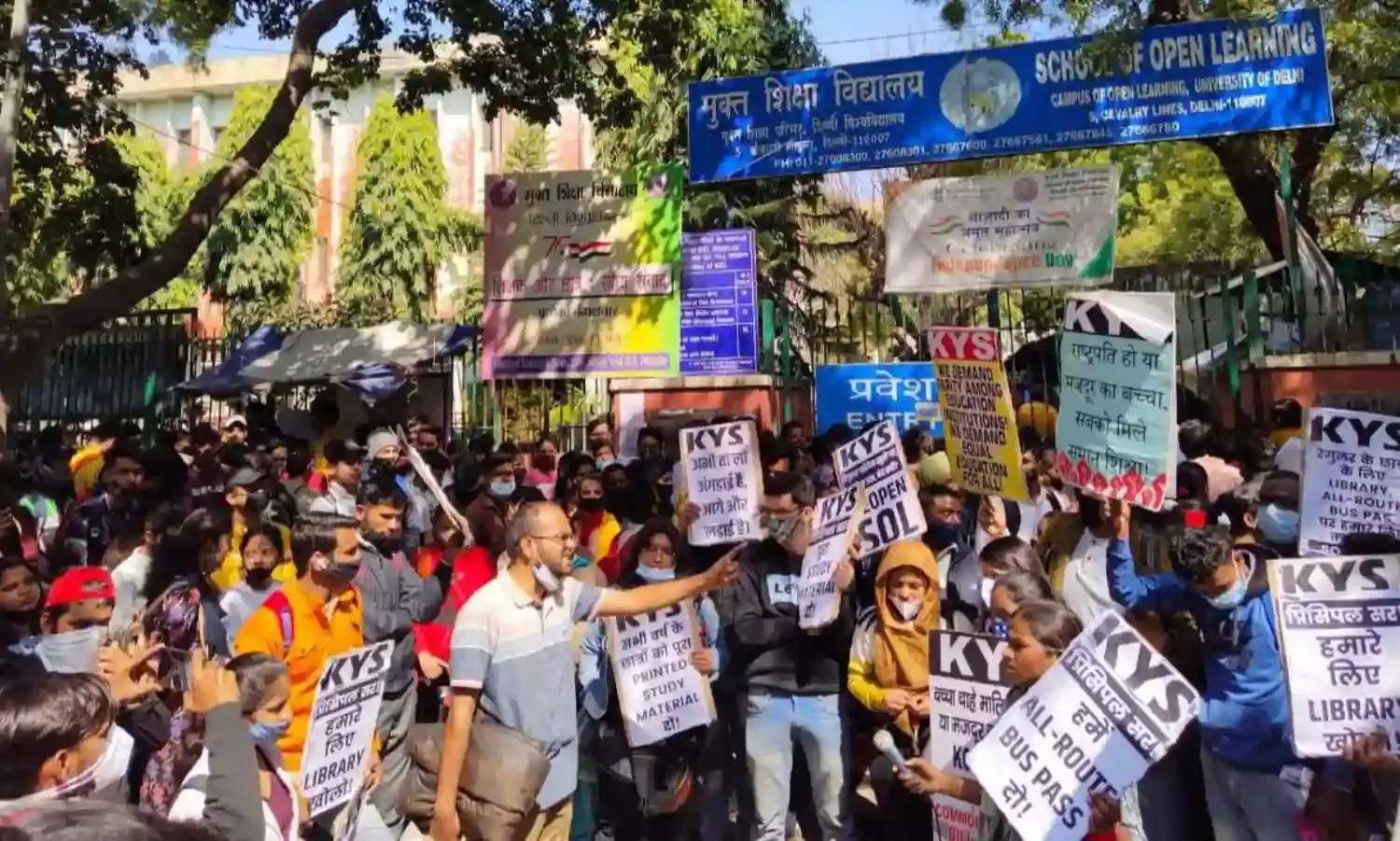
“My hand is fractured. I have scratch marks on my neck, my back hurts from being kicked from behind, and I’m scared because we’re fighting for education but it is our education that’s suffering in the end,” said Jatin, a second-year student at Delhi University’s School of Learning.
He is one of the students who say the SOL administration confined and assaulted them as they were on their way to the Office of the Principal to submit a memorandum with their demands.
On February 18, members of the Krantikari Yuva Sangathan and other students from the School of Open Learning staged a protest. The students gathered outside the SOL gate to demand a hybrid mode of examination as opposed to compulsory physical exams, the commencement of weekly classes, and the distribution of study material to the students, among other requests.
Students in huge numbers flooded the gates of the SOL campus to organise a peaceful protest. However, the protesting students alleged that the administration of SOL had been extremely hostile to them.
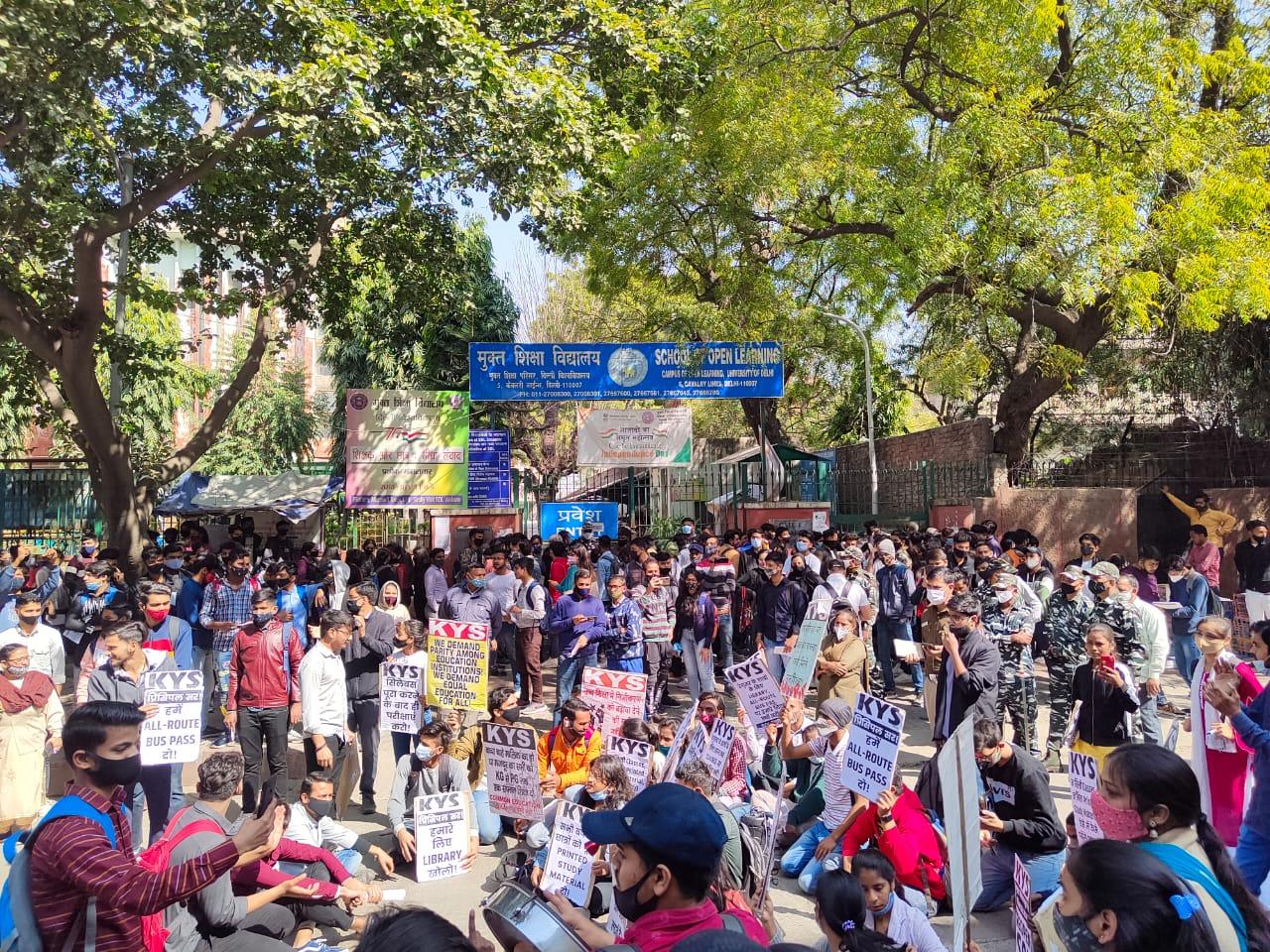
“We went on a protest and requested to let the students in to hand our memorandum of demands, but they shut the gate on our face. There was agitation as to why the students were not even allowed to submit the memorandum. We were not there to fight, but we were there to raise our demands,” SOL student Mandvi Mishra told The Citizen.
With the protest gathering on the road, two student delegates were later allowed to enter the building to submit the memorandum to the principal; however, the two students allege that as soon as they got into the building they were mishandled.
“As soon as we entered the building, the gates were locked and a crowd of 25-30 people surrounded us. When I showed them my I-card, they snatched it from me and confiscated it; the other student, who had his card on his phone and showed it to them as well but they even tried to take away his phone, though he resisted.
“Then they began to abuse us; I was kicked, and my other associate was kicked and slapped. He still has scratches from the physical assault. We were escorted by a constable, but that didn’t stop the crowd from attacking us. We then went into the principal’s office, where he was already present. As we entered around 30 people entered the room with us, we were hurled with abuses by the crowd as well as the principal,” says Bhim Kumar, a student and member of KYS.
“They threatened to suspend, fail, or expel me from the university. While the crowd continued to bully us, the principal sat across from us and verbally abused us. They were yanking our hair, kicking us, and verbally abusing us. The level of abuse was so revolting that I can’t even say it aloud. Someone even questioned as to why I am studying, they called me ‘neech’ and asked me to do what my father does: drive a rickshaw.
“We attempted to flee this hostile environment. The constable escorting us also asked the authorities to open the gate and let us out but they refused. We had to jump over the gates to leave the premises because of the situation,” recalls Jatin.
He incurred injury due to this incident. His arm was fractured, and he was taken to Hindu Rao hospital for a medical checkup and preliminary treatment.
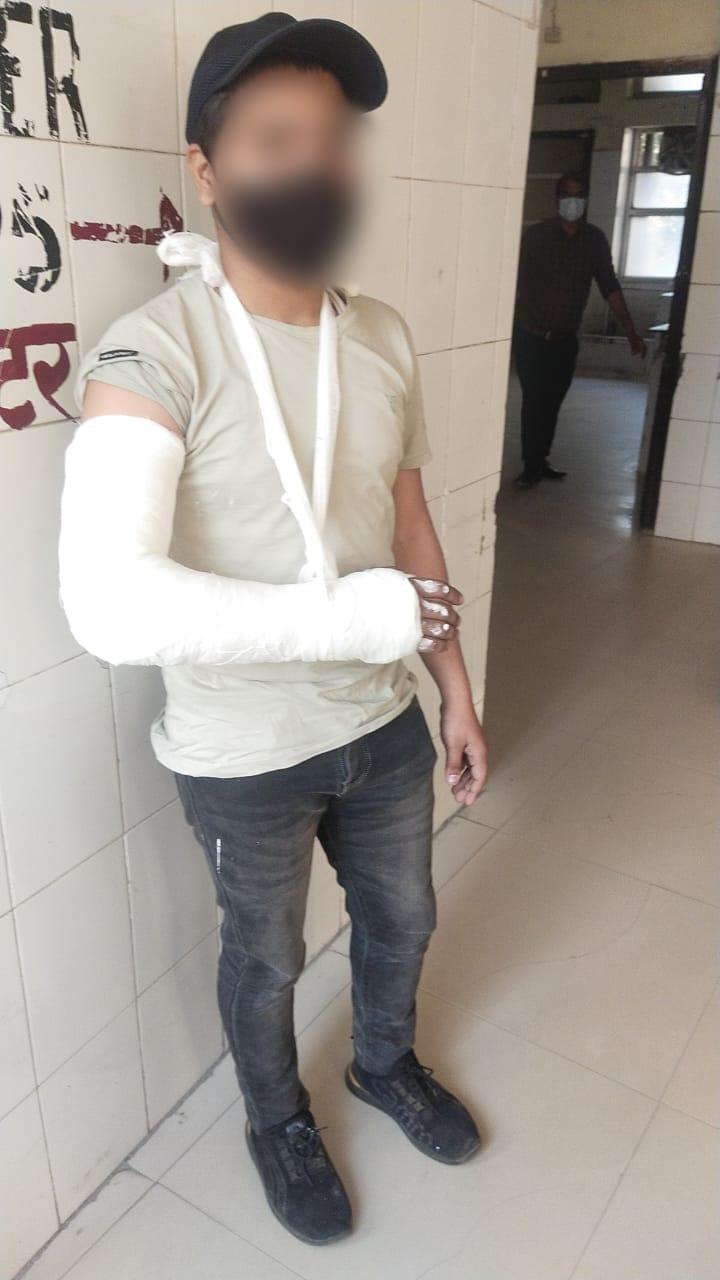
Students and members of the KYS condemned the violent act and demanded a public apology from the SOL administration. They also asked the SOL principal, Uma Shankar Pandey, to admit responsibility for the incident and resign.
“Protest is our constitutional right, but if someone gathers the courage to ask questions they are manhandled for it. Because they know the people asking relevant questions are SOL students who come from marginalised groups, and so the administration thinks they can get away with punitive actions as they have the impression that these students are from socially backward, low-income backgrounds, whose families may not have any political backing,” says Mudita Singh Kushwaha, an active member of KYS.
However, the University has a different story to tell. Principal Pandey has filed a police complaint alleging that some agitating students entered the building, misbehaved with female security guards and abused the staff. The students deny these claims.
“Before this protest we also organised an online campaign to express our objections to mandatory physical examination mode. Many colleges in DU have opened as of the 17th of February, and SOL has also announced examination dates for students, which vary depending on the course. Some of the exams begin as early as March 23rd. However, the study material has not yet been distributed to all students.
“Thousands of students visit the campus, but either they are sent back empty-handed with the instruction to return later, or they are given insufficient study material. As a result, students are not well prepared to take offline exams because they lack study material, time, and class support to help them score well,” said Bhim Kumar.
SOL recently announced that physical classes will commence on March 6. These are pervasive problems at the School irrespective of the course.
“They are yet to provide us with the study material. We haven’t received anything neither in hard copy nor soft copy, but exams are due in May and this has made many students very anxious,” says Priya (name changed), a third-year student enrolled in the BA program at SOL.
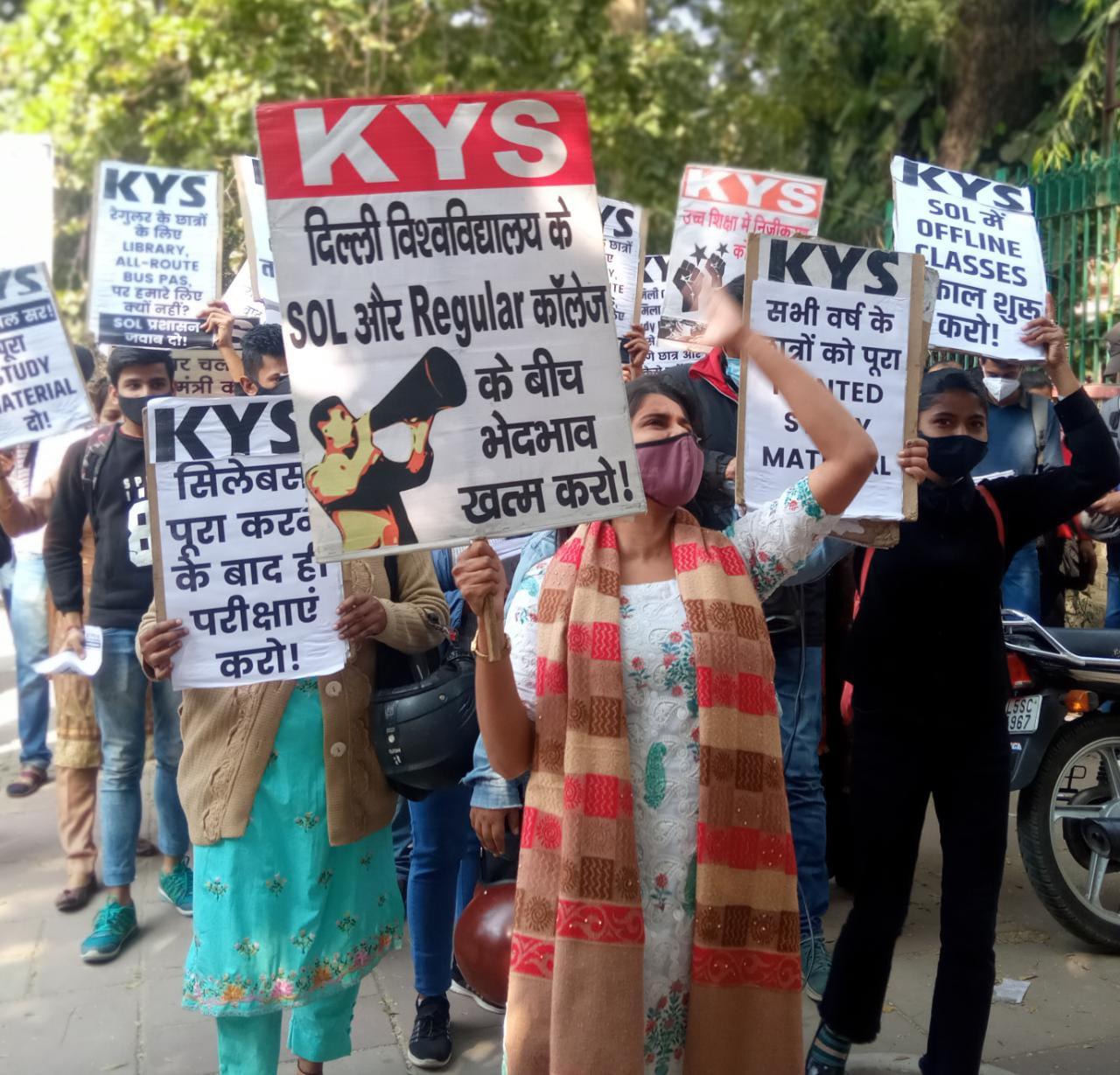
Many of the students pursuing education from SOL come from lowered-income backgrounds that force them to work to support their families, which only adds to the problem of mismanagement of not having enough study material or the limited time provided to prepare for exams.
“We are mistreated whenever we ask for study materials, and even the guards shoo us away from the gates. There have been times when they have also heckled us, and they have never given us an explanation for why we haven’t received the material. I’ve already been to campus ten times and come back empty-handed each time,” said Dipanker Pandey, an SOL student.
The additional cost of travel is frequently overlooked by authorities.
“For many, the cost of getting to campus may become prohibitively expensive. Not only that, but many of the families of girls pursuing these courses are orthodox, raising concerns about the women who have to travel so far to obtain the necessary books only to be denied time and again,” said Mudita.
With their working hours, taking days off has heavy repercussions for many as they may have their salary deducted which their family relies on.
“My father’s ailing health has put pressure to support my family. And if I take a day off my employer who gives me 300 Rs a day deducts 1300 from my salary, so no matter what I have to go and work.
“Even with my fractured arm, I had to bear this pain and go to work. So when the university does not provide us with sufficient time to study, all they are ensuring is that we don’t get the rightful education we are entitled to,” says Jatin.
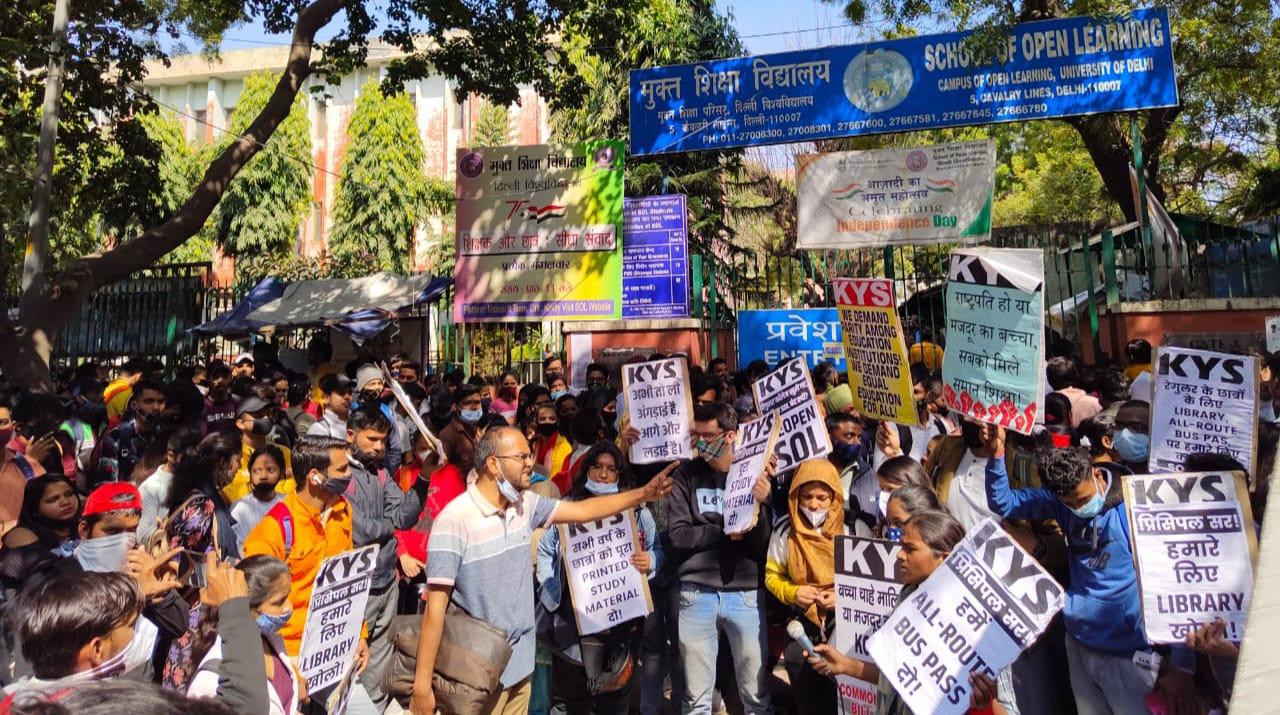
There is a sense of fear in the students since the campus assault; many feel hopeless.
“Several of my friends have given up hope, fearing that they will either fail or perform poorly in light of the current circumstances. What is the point of saying anything to them if the students are treated this way?” asked Priya.
“A sense of hopelessness is being bred by the authority and administration,” said Mudita.
“We don’t need much, we aren’t asking for charity. All we are asking for is timely classes and our study material so that we may study and have a career so that we can provide for ourselves. But now I am really scared that I may not even go to the campus alone, for I don’t know what will be waiting for me,” sighs Jatin.



